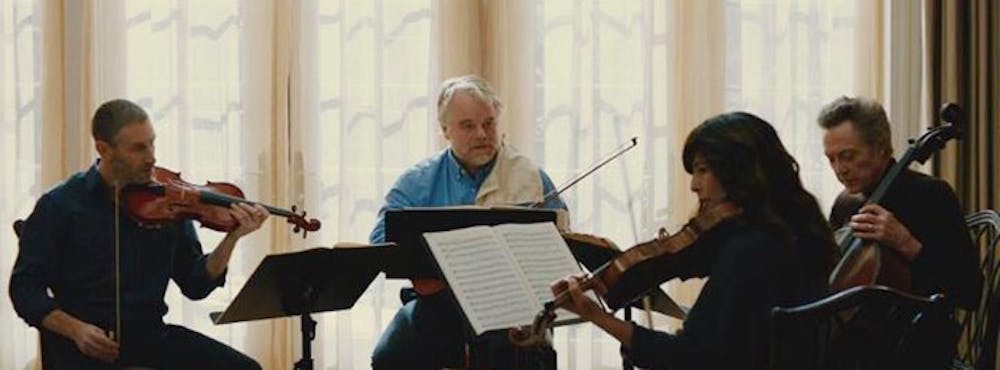Love, music, old age, generational strife: all of these themes are touched upon in Yaron Zilberman’s (“Watermarks”) somber and meditative piece “A Late Quartet.”
“A Late Quartet” opens with the members of the quarte formed at Juilliard called the Fugues. Peter Mitchell (Christopher Walken, “Seven Psychopaths”) Daniel (Mark Ivanir, “Big Miracle”) and a husband and wife, Robert and Jules (Phillip Seymour Hoffman, “The Master,” and Catherine Keener, “Peace, Love, & Misunderstanding”) are preparing to play one of their final concerts together.
The film then flashes back to a critical moment, where Peter announces that he is in the first stages of Parkinson’s disease and will have to replaced as cellist for the group. Peter’s deliberate retirement sparks off a heated conflict between Robert and Jules about Robert’s wish to be more than the “second violinist” of the quartet, eventually leading to Robert getting into an extramarital affair. Meanwhile, Robert and Jules’s daughter Alex (Imogen Poots, “Fright Night”), an upcoming violinist in the footsteps of her parents, also begins having an affair with her mentor.
“A Late Quartet,” with its lush, sweeping classical music score by Angelo Badalamenti (a frequent collaborator with David Lynch on soundtracks for “Blue Velvet” and “Mulholland Drive”) is a drama that examines the difficulty a group of musicians have in keeping together in old age.
Walken gives a tragic, if compelling, performance as a man who begins to experience the first painful pangs of Parkinson’s but remains the central heart of the group who keeps them together.
Hoffman and Keener also give rather melodramatic performances, but they are believable as a couple whose marriage is on the rocks.
Most of the movie is filmed in close-up, which emphasizes the drama of the piece, save for a few obvious establishing shots of the city. The crisp cinematography is thanks to veteran cinematographer Frederick Elmes (“Blue Velvet”).
This is Silberman’s first feature film (his previous feature, “Watermarks,” was a documentary about a swim team during WWII). While he does not offer anything quite new in terms of how a conflict threatens to override a group of tightly bound musicians, the way the actors truly deliver heartfelt performances makes it rise above the material written.
Though the age of the characters makes it seem like the film is aimed at an older audience, its message about how drama can both divide and unite people is universal.
thescene@theeagleonline.com





